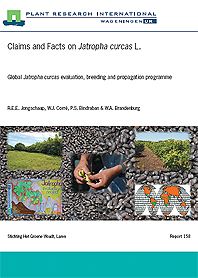Scientists at Plant Research International (Wageningen University)are involved in an international research programme for the evaluation, breeding and propagation of the tropical oil plant Jatropha curcas. In a report published in October 2007, the researchers have warned of exaggerated expectations of the plant – particularly relating to high-yield oil production: 
It has become clear that the positive claims on Jatropha curcas are numerous, but that only few of them can be scientifically sustained. The claims hat have led to the popularity of the crop are based on the incorrect combination of positive characteristics, which are not necessarily present in all J. curcas accessions, and have certainly not been proven beyond doubt in combination with its oil production.
The claims projected on J. curcas include that the crop:
a) reclaims marginal soils,
b) grows well under saline conditions,
c) is drought tolerant and may have low water use (or high water use efficiency),
d) has low nutrient requirements,
e) is an energy crop,
f) grows seeds with high oil contents,
g) provides high oil yields,
h) provides oil of high quality,
i) requires low labour inputs,
j) does not compete with food production, and
k) is tolerant or resistant to pests and diseases
Hard figures and verifiable data on various aspects of J. curcas remain scarce, but in the report ‘Claims and Facts on Jatropha curcas L.’ the latest and most important scientifically sound information is included. The report reveals that the wild species J. curcas has great potential and value to be exploited in its natural environment of semi-arid and arid conditions in the tropics. The traditional and successful application of J. curcas includes functions like soil water conservation, soil reclamation, erosion control, living fences, firewood, green manure, lightning fuel and local use in soap production, insecticide and medicinal application at modest scale.
However, as soon as J. curcas is related to high oil yield production, a claim which in itself is not backed up by any scientific findings so far, (especially not at large scale), a risk warning should be given about the validity of these claims. Especially the claims of low nutrient requirements (soil fertility), low water use, low labour inputs, the non existence of competition with food production, and tolerance to pests and diseases are definitely not true in combination with high oil yield production.
Further information
- Full report Claims and Facts on Jatropha curcas L. (PDF-document, 5.7 MB)
- Jatropha curcas evaluation, breeding and propagation programme (JEP)
- FACT (Fuels from Agriculture in Communal Techology): World knowledge centre on biofuels for local development
Contact
Plant Research International, Wageningen UR
Dept. Agrosystems Innovations
Dr. R.E.E. Jongschaap
P.O. Box 16
NL-6700 AA Wageningen
E-Mail: raymond.jongschaap@wur.nl
Tel.: 0031-317-47 59 53
(Cf. news of 2006-12-07, 2006-09-04 and 2006-02-09 .)
Source
Plant Research Inernational (PRI), Wageningen UR, 2007-11.
Share
Renewable Carbon News – Daily Newsletter
Subscribe to our daily email newsletter – the world's leading newsletter on renewable materials and chemicals









